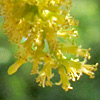Prosopis alba is a medium-sized tree, measuring between 5 and 15 m in height with a short trunk and a broad canopy sometimes reaching 10 m in diameter. The trunk may reach 1 m in diameter, though such large specimens occur very rarely at present. The bark is thin, brown-grayish in color, with streaks, and it has tanning properties. Thorns usually present on trunk and branches, sometimes strongly, usually large, but thornless forms are also available.
Prosopis alba is native to the semi-arid regions of South America, North-Western Argentina, Northern Chile, Bolivia, Paraguay, and Uruguay. It has been planted in South-Western US, Morocco, Senegal, Sudan, Pakistan and India for ornamental and utilitary roadside planting and windbreaks. It is moderately drought and salt tolerant.
Prosopis alba leaves are bipinnately compound in groups of 2 or 4; closely-spaced leaflets, paired leaflets, 6 mm long; 25-50 leaflets per pinnae.
The minute flowers arranged in 7–11 cm long catkins. They are yellowish or cream; bloom in spring or early summer; only moderately showy. The flowers are bisexual with a small calyx, 5 petals, and five stamens. Self pollination is prevented because the pistils a receptive before pollen is dispersed by the same flowers. Pollination is by wind or insects.
Prosopis alba fruits are 20 cm long pods that are edible like those of the Carob tree. Generally they are very curvy, e.g. along flat side or twisted screw-like along edge or both. Pods beige to off-white, from which the species name alba, white in Latin, originates. The pods are high in sugar (about 35%). They can be ground to produce a sweet floury paste (patay), very high in energy, that can be used for fodder or turned into flour for human consumption. In the 1940s a mildly intoxicating beverage called aloja was made from it through fermentation; in turn it can also be distilled to produce ethanol.
As in many Leguminosae plants, the seed coat is very hard and for good germination te seeds require mechanical scarification. There are about 36,000 seed/kg. To enhance germination, the seeds may also be soaked in water at room temperature for 12 hours. In order to obtain uniform propagation material, trees have been cloned using rootings or cutting techniques.
Prosopis alba timber, which is rather dense (0.76 g/cm3) and difficult to work, is used for doors and floors, for paving blocks, and wine casks. The wood responds well to drying and is therefore valuable for work that requires stable dimensions regardless of humidity. It is also durable for outdoor use.
The Prosopis genus is comprised of over 45 species of trees. In the flora of Israel we know Prosopis farcta, which appears aboveground as a dwarf shrub but is viewed as an "underground tree" due to its extensive rhizome system that connects the stand of small plants which seem like individuals but are parts of a very large single plant covering a large area.
Written by Amram Eshel







